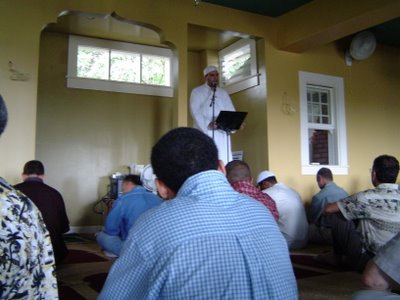
Islam and democracy
Muhamad Ali,
The Jakarta Post, Nov 4, 3006
When I was writing my dissertation on Islamic knowledge and power relations, I came across an interesting book entitled Faith in Moderation: Islamist Parties in Jordan and Yemen, by American author Jillian Schwedler.
The book could not be more timely. It provides interesting insights into the relationship between the inclusion of emerging Islamist groups into the democratic political process, and their moderation. It is relevant not only to the Middle East but also Malaysia and especially contemporary Indonesia in its transition to democracy.
The background is the contention, especially prevalent in the West, that Islamism is inherently a negative force in the process of democratization. There is a contrasting argument that the recognition and inclusion of Islamist groups in the democratic process will necessarily lead to their moderation and thus smooth the path to democracy. Neither contention is quite correct, although, according to Schwedler, the second is more reasonable than the first.
I share her agreement that an honest commitment to democratization in the Muslim world requires the recognition that Islamists are legitimate political actors with substantial constituencies. They cannot be excluded from the political arena, although they do not aspire to the same secular vision of freedom, equality, and tolerance that other Muslims and non-Muslims embrace.
Including them in the democratic, constitutional process will reduce radicalism. With inclusion, Islamist parties in Indonesia and elsewhere have become relatively more open and tolerant of alternative perspectives.
Using two cases, Jordan's Islamic Action Front (Jabhat al-'Aml al-Islami) and the Yemeni Congregation for Reform (Tajamma' al-Yamani li al-Islah), Schwedler argues that inclusion may increase moderation and reduce radicalism in a variety of ways. These include turning radicals into moderates; turning fence-sitters (those teetering between moderation and radicalism) into moderates; making moderates even more moderate, and/or providing moderates with opportunities to increase their visibility and efficacy.
Many Islamist groups talk about democracy (dimuqratiyyah), political pluralism (ta'addudiyyah), tolerance (tasamuh), and human rights (huquq al-insan), but they interpret these principles within the framework of an Islamist worldview. In a sense, this phenomenon is constructive because it gives us multiple interpretations of democracy, but it is not clear how well other groups will understand this plurality of definitions.
In my view the Islamist ideology of not separating religion and politics does not in itself guarantee moderation, justice, fairness, clean government and tolerance.
Another crucial issue to be addressed is the tendency among the Islamists to act as representatives of the "Muslim community". This self-representation has become an excuse for them to pursue whatever they themselves regard as "Islamic".
For example, some Islamist groups in South Sulawesi, Banten, Padang, Cianjur, and other local areas where Muslims are a numerical majority portray themselves as representative of all Muslims in the region. They often fail to recognize the diversity of Muslim ideas on politics, economy, and society.
They want other Muslims, regardless of their political and ideological inclinations, to be like them and to follow their political path as the only true path to Islam. In short, the degree of tolerance may be reduced according to the ideology and interests of the religio-political leaders.
In addition, there is a high degree of probability that some Islamist political parties will use the democratic process to pursue undemocratic goals and agendas, whether hidden or transparent.
In addition, there is a high degree of probability that some Islamist political parties will use the democratic process to pursue undemocratic goals and agendas, whether hidden or transparent.
Certainly these issues, among others, are for the Islamist political parties to deal with. They are also of concern to non-Islamist parties and civil society on the path toward ensuring democracy.
Finally, Islamist political parties have generally been uncritical about the theories of Muslim ideologues outside the country. There is a tendency to simply adopt foreign ideas that are not always relevant or good for the democratization process in a multicultural and multi-religious Indonesia.
Substantive, tolerant politics will tend to be ignored if an Islamist group focuses on symbols, rituals, and products. They should concern themselves, instead, with more universal values such as the promotion of literacy, justice, clean government, law and order, and peace.
Here I am not going to generalize that all Islamist groups and parties are the same in attitude and behavior. Nor do I regard Islamists as different from the secular groups and parties in their political agenda and behavior.
The inclusion of Islamism in the democratic process is just another step closer to moderation than the complete exclusion of the previous eras. The course of the future of Islamism in Indonesia remains to be seen, but the issues outlined above need to be addressed if Indonesia is to be truly democratic in intention, means, agenda and goals.
==========
Picture on the left: A respected young imam delivered his sermon in a mosque in Honolulu. My comment: This imam does not feel the need to create an Islamic political party to reach the goal of an Islamic community in a Protestant-majority, secular country of the United States of America. For many Muslims in the U.S., a secular democratic state is preferable for them. So how do countries with Muslim majority would think about this?



1 comment:
The dynamics of a functional democracy is a vibrant citizen involvement as it's base.
It took 200 years for the USA to implement 'one man one vote'.
Aghganistan has a democracy and a Constitution that declares 'freedom of religion', yet when a Muslim converted to Christianity recently 99% of the population wanted him to be killed.
Democracy is an illusion.
Post a Comment